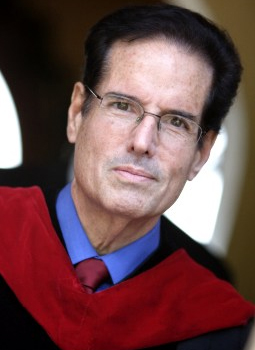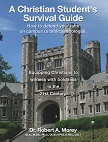Is The Sabbath for Today? -- Part 4
By: Dr. Robert A. Morey
Sabbatarians reason that since the command to keep the Sabbath is found in the Ten Commandments, it must be a moral law. Dr. Robert Morey responds to this argument.
“But,” the Sabbatarian replies, “regardless of all you have said, [Sabbath-keeping] is still found in the Ten Commandments and this means it must be a moral law or it wouldn’t be found there.” In reply, we must observe the following points:
1. Is everything in the Ten Commandments moral? Is there not a mixture of ceremonial and moral within the Decalogue itself?
Fifth Commandment—Obey your parents and “you will live long on the land which God has given to you.” Who would say that living in the land of Israel is a moral law? Even the Puritans pointed this out as a ceremonial element in the Decalogue.
Fourth Commandment—“The seventh day is the Sabbath.” Who, besides those who view Saturday as the Sabbath, would say that this is a moral law? Christian Sabbatarians such as Ezekiel Hopkins pointed out this ceremonial element.
2. Since Christian Sabbatarians admit that there is a mixture of moral and ceremonial law in the Decalogue, the fact that the Jews were commanded in the Decalogue to keep the seventh day as a Sabbath cannot prove it to be a moral law.
3. Archaeology helps us to understand why in the midst of the covenant Decalogue you find a ceremonial law. In the covenant treaties of the Great Kings in the Ancient Near East, a ceremony would be given in the midst of the treaty to act as a sign of covenantal obedience and submissiveness by the vassal slave to the conquering king.
The covenant servants could break the other parts of the covenant and find forgiveness. But if they forsook the ceremonial sign of covenantal obedience to the king, then the covenant as a whole was viewed as broken.
- The structure of the Decalogue is like the treaties of the Great Kings (Meredith Kline, The Treaty of the Great King (Eerdmans: 1963), pp. 27-44.)
- The Sabbath was the sign of Israel’s covenantal obedience and submission (Exodus 31:12-17; Isaiah 56:4-7; Deuteronomy 5:11).
- Once Israel abandoned the Sabbath, God abandoned them (Ezekiel 20:12, 20-24).
4. The Ten Commandments as written by the hand of God were only ten short and brisk commands. People have always confused Moses’ exposition of these commands with the commands themselves. For example, the Tenth Commandment according to Paul in Romans 13:9 is, “You shall not covet.” It was Moses who added several illustrations of the kinds of things we should not covet: house, wife, servants, etc. (Exodus 20:17). The Ten Commandments are as follows:
Moses would read the sentence and then expound upon it for the benefit of his hearers. For example, inExodus 20:17, we read “You shall not covet.” The same words are found in Deuteronomy 5:21.
But when Moses illustrates what kinds of thing we should not covet, the words are not the same. The following comparison reveals that some words were added or omitted, and the order is not the same. Obviously, Moses was not reading what God wrote on the tablets of stone.
Exodus 20:17— house, wife, male slave, female slave, ox, donkey
Deuteronomy 5:21— wife, house, field, male slave, ox, donkey
When it comes to the Fourth Commandment, the only words God wrote on the tablet of stone were, “Observe the Sabbath day.” All the other words were from Moses who tried to explain to the people what the commandment meant.
For example, the Sabbath day is to be a day of rest. But who is to rest on that day? God did not say. Thus Moses had to illustrate who was to rest on that day.
That this is true is seen from the fact that when Moses illustrated in Exodus and in Deuteronomy who was to rest, the lists are not the same. He adds some words in Deuteronomy not found in Exodus.
Exodus— you, son, daughter, male slave, female slave, cattle, sojourner
Deuteronomy— you, son, daughter, male slave, female slave, ox, donkey, cattle, sojourner
The idea that Moses would add new words to what God had written with His own finger is absurd. Moses probably added oxen and donkeys to the list because some Jews had limited resting to only those animals specifically mentioned by Moses in Exodus 20. Thus they were making their oxen and donkeys work on the Sabbath but not their cattle.
When Moses tried to explain to the Jews why they should keep the Sabbath, he gives a different reason in Deuteronomy 5 than what he gave in Exodus 20. While in Exodus 20, Moses referred to the Creation week, in Deuteronomy 5 he omits any reference to the Creation week and instead refers to the Exodus out of Egypt. If God had written the words in Exodus 20 about the Creation week, Moses would not have substituted them with a reference to the Exodus. The following comparison reveals that the Creation reference was not part of the Ten Commandments but was Moses’ added commentary.
Exodus 20:11—For in six days the LORD made the heavens and the earth, the sea and all that is in them, and rested on the seventh day; therefore the LORD blessed the seventh day and made it holy.
Deuteronomy 5:15—And you shall remember that you were a slave in the land of Egypt, and the LORD your God brought you out of there by a mighty hand and by an outstretched arm, therefore the LORD your God commanded you to observe the Sabbath day.
What does this mean? The reference to the Creation week in Exodus 20 was not part of the original Ten Commandments. Thus it was not part of the “moral” law!
This insight pulls the rug out from beneath both Christian and cultic Sabbatarians. Most of their rhetoric is based upon the idea that the reference to the Creation week was part of the Ten Commandments. The fact that Moses omitted any reference to it in Deuteronomy 5 and substituted the Exodus instead forever dooms their argument.
These observations also refute the argument that since Moses referred to the Creation in Exodus 20, this means that the Sabbath began at the Creation. If this argument was valid, then since Moses only mentions the Exodus out of Egypt in Deuteronomy 5, we would have to conclude that the Sabbath began with the Exodus. But, in the context, Moses was not dating the inception of the Sabbath, but rather he was motivating people to obey it.
There are many other arguments which show that the Sabbath was a ceremonial law.
- Old Testament and New Testament writers consistently place the Sabbath in the lists of the other ceremonial laws. No moral law is grouped or listed with ceremonial laws (I Chron. 23:31; II Chron. 2:4-8,13; 31:3; Neh. 10:33; Ezek. 45:17; Hos. 2:11; Col. 2:16; Heb. 4).
- How could God despise Sabbath-keeping and put an end to it if it were a moral law (Isa. 1:10-14;Hos. 2:11)?
- If it is a moral law, why is it never repeated in the New Testament like the other nine commandments?
- The author of Hebrews treats the Sabbath like all other ceremonial laws, i.e., as a type or shadow of Christ’s work of salvation (Heb. 4; cf. Col. 2:17).
- Jesus clearly equated “Sabbath” with the ceremonial “sacrifice” in Matthew 12:7. Thus, He taught that it was a ceremonial law.
- The Jerusalem Council in Acts 15 was faced with a direct question which certainly bears on the Sabbath issue. “How much of Mosaic law should the Gentile Christians keep?” If Sabbath-keeping was a moral law binding on Gentiles, then they would have included it in their decision. But they did not bind the Gentiles to obey the Sabbath. Thus it was only a ceremonial law fulfilled in Christ.
- If it were a moral law, then the apostle Paul would never leave its observance up to Christian liberty as he taught in Colossians 2:16.
- If Sabbath-keeping was binding on New Covenant believers as a part of the moral law, then why did the early Christians: a)work on Sundays without complaint; b)never call the “Lord’s Day” a “Sabbath”; c) consistently teach that the Fourth Commandment was a ceremonial law fulfilled by Christ and as such no longer binding? Centuries went by before anyone talked about a “Christian Sabbath.” Why? Where is the apostolic and historical pedigree for the Sabbatarian doctrine? It has no such pedigree.
- It is geographically impossible for all men to keep the Sabbath. What would those in cold climates do without heat (Exo. 35:1-3)? In the far North where there are six months of day and six months of night, how can the Sabbath be kept? Is it not true that a moral law can be kept anywhere? But the Sabbath cannot be kept universally across this planet, which has days of different lengths. What will colonies on Mars or on space stations do about the Sabbath? These are issues the Sabbatarians will have to face in coming years, if the Lord tarries.
- The Jewish Sabbath lasted from Friday sundown to Saturday sundown. If the Fourth Commandment is still in effect as a creation ordinance, then why do Christian Sabbatarians not begin their Sabbath Saturday evening and end it Sunday evening? How can they brush aside the sundown” to “sundown” structure of the Old Covenant Sabbath?
- It is economically impossible to shut down our modern industrial society every Sunday. If the steel mills turned off their furnaces one day out of the week, it would be impossible to produce steel, for it takes a week for them to heat up sufficiently to begin production (cf. Gary North, “The Economics of Sabbath Keeping,” in The Institutes of Biblical Law, pp. 824-836).






































